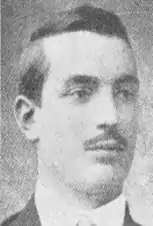Filippo Amedeo | |
|---|---|
 | |
| Personal details | |
| Born | 2 February 1891 Turin |
| Died | 18 June 1946 (aged 55) |
Filippo Amedeo (2 February 1891 – 18 June 1946) was an Italian politician and worker, socialist leader and parliamentarian..
Amedeo was born in Turin. He represented the Italian Socialist Party in the Chamber of Deputies from 1921 to 1926 and in the Constituent Assembly of Italy for a short time in 1946.
Biography
Birth and youth battles
Filippo Amedeo was born on 2 February 1891 into a working-class family of very modest origins, so he was forced to learn a trade from a very young age. He became a carpenter and cabinetmaker and became involved in the trade union field, where he distinguished himself for his organizational skills and combativeness, becoming secretary of the Turin League of Woodworkers and subsequently secretary of the National Federation and member of the executive committee of the Chamber of Labour. He became involved in politics at an early age, approaching the anarcho-socialist and anti-militarist positions found in the socialist youth organisation. In 1909 he was reported as a member of the Social War Herveist group, inclined towards Sorelian revolutionary syndicalism.
The Libyan war
Despite his pacifism, in 1911 he was forced to take part in the Libyan war and in 1915 he was called up to arms in the First World War. However, he did not stop carrying out anti-militarist propaganda activities and for this reason he was twice subjected to military proceedings and subsequently condemned.[1] He was a valiant soldier who did not want to be decorated for a war he did not believe in because it was in clear contrast with his anti-militarist principles. In 1918 his relations with the Turin socialists for the dissemination of propaganda material were intercepted and therefore he was tried with his companions, taking on responsibilities that were not his in order not to reveal the organizational plot. In 1920 he played an important role in the occupation of the factory for which he had worked since returning from the war, the Garavini mechanical plant; he also participated in the bitter conflicts between capital and labor that erupted with the demobilization and return of the veterans.
From incarceration to electoral success
On November 20, 1920 he was arrested and imprisoned; that same day his mother died due to the pain of hearing the news of her son's incarceration. The dignity with which Amedeo experienced prison did not go unnoticed and his party colleagues indicated his name as a protest candidate in the 1921 elections. He was voted by plebiscite, coming third after two established leaders of Turin's reformist socialism with Giulio Casalini and Giuseppe Romita; in May 1921 he left his cell in the Carceri Nuove of Turin to take the seat of Palazzo Montecitorio as a deputy of the XXVI legislature. In the political struggle of those years he sided with the maximalist tendency of Giacinto Menotti Serrati, Arturo Vella and Olindo Vernocchi which at the 1922 congress would lead to the expulsion of the reformists, without embracing the fusionist positions. With Nenni he launched, already in 1923, the national socialist defense committee, where he was elected secretary of the federation, a position he held until 1926, alongside Romita and Barberis.
His anti-fascist militancy.
He was successfully re-elected in 1924 and from then on began his battle against the regime, first on the benches of Parliament, then in the anti-fascist emigration. He joined the National Socialist Trade Union Committee, in a difficult moment, when the tension between the various trade union components of the left was at its peak, failing to find an agreement for a common anti-fascist opposition on the social terrain, with oscillations that ranged from the legalitarianism of the General Confederation of Labor to the insurrectionism of the communists.
References
- ↑ Anonimo. "Filippo Amedeo | ANPI". www.anpi.it (in Italian). Retrieved 2023-12-14.